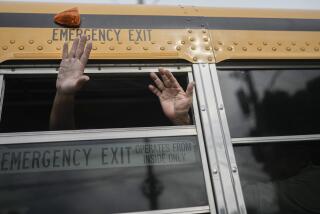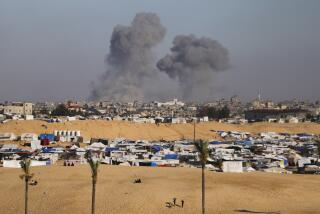CIA Will Resume Airdrops of Weapons to the Contras : Foes Brace for Reagan Blitz on Aid
WASHINGTON — President Reagan today authorized the CIA to resume airdrops of weapons to Nicaragua’s Contra rebels, as congressional opponents worked to offset an expected presidential lobbying blitz for an extension of military aid.
In a speech to Administration political appointees today, the President reiterated his belief that only continued military pressure on Nicaragua’s leftist Sandinista government will lead to peace for the region.
“We must have the courage to stand behind those who continue to put their lives on the line for democracy in Nicaragua,” Reagan said.
Airdrops Suspended a Week
The airdrops had been suspended for the past week because of the weekend meeting in Costa Rica of the five Central American presidents who signed a peace accord Aug. 7.
The rebels are currently operating on a short-term infusion of humanitarian aid approved before Congress left for its holiday recess, including money to pay for CIA airdrops of previously stockpiled weapons and ammunition. That money is expected to last through next month.
Presidential spokesman Marlin Fitzwater said President Reagan would sign a certification today allowing the airdrops of weapons to Contras, continuing pressure on Nicaraguan President Daniel Ortega to implement democratic reforms.
House Vote Feb. 3
The House is to vote Feb. 3 on Reagan’s request for an as-yet-undetermined amount of new military aid. If it approves the request, the Senate would vote the next day.
“This is really a gut issue for the President,” said Rep. Lee H. Hamilton (D-Ind.) an opponent of the aid renewal Reagan is expected to seek for the rebels on Jan. 26. “It is his highest foreign policy objective. The Administration will pull out every stop in order to win this vote.”
But the Administration’s task in winning new lethal supplies was made more difficult over the weekend when President Ortega promised to make substantial concessions to keep the peace process alive. Ortega vowed to lift the state of emergency in his country that has curtailed civil liberties, to hold direct talks with the rebels aimed at reaching a cease-fire and to release political prisoners when a truce is arranged.
Ortega Action Pivotal
White House spokesman Marlin Fitzwater said today that the amount and composition of the new aid request will be determined by what Ortega does in fulfilling those promises, a view shared by aid opponents.
“The pressure (from the Contras) has been the clear reason that we’ve gotten as far as we have,” Fitzwater said. “Now is not the time to back off. Now is the time to say: ‘All right, Mr. Ortega, you said this is what you would do. Do it.’ ”
“The issue remains in doubt,” said Hamilton, who was in Costa Rica over the weekend to observe the regional summit as part of a delegation sent by House Speaker Jim Wright (D-Tex). “The extent to which Ortega implements the concessions he made at San Jose will be critical.”
‘Swing’ Members the Key
Hamilton and House Majority Whip Tony Coelho of Merced, the Democrats’ chief vote counter, said the matter will be decided by about 30 to 50 “swing” members who have voted differently on Contra aid in the past, depending on circumstances surrounding each vote.
Coelho sought to frame the issue as one of whether the United States should pursue a policy of heavy-handed interference in the region, treating the Central American countries as “banana republics.” The Administration sees the fight as a matter of heading off communism in the hemisphere.
More to Read
Sign up for Essential California
The most important California stories and recommendations in your inbox every morning.
You may occasionally receive promotional content from the Los Angeles Times.










